FAQs
Yes. A team of 50–100 students is not small compared to many other programs the University proudly supports. Forensics is similar in size to athletic teams like rowing, tennis, or gymnastics, as well as choirs, theater productions, or honors cohorts — all celebrated for their excellence and impact.
But the influence of Forensics extends far beyond headcount. Students in Forensics are consistently overrepresented in leadership across the university — from the DFC and PFC to the ASUO. In classrooms, they elevate the academic experience for everyone: they arrive prepared, bring organized ideas, and infuse discussions, projects, and presentations with extra sophistication and scholarly depth.
The results speak for themselves. With about 70 students in the program this past year, 15 were selected as Morse Scholars — one-third of the total cohort, drawn from more than 23,000 eligible students. Forensics students are also consistently overrepresented among Stamps Scholars, and the program has produced Oregon Six recipients, Truman Scholars, Marshall Scholars, and several Rhodes Scholar finalists and semifinalists. Few programs of any size can point to such a record of academic distinction.
Unlike most other small programs, Forensics also travels nationally, raising the university’s profile among high school students, undergraduates, and graduate schools nationwide. Its annual high school tournament even creates a direct pipeline of talented students to Oregon. In this way, Forensics is a transformative experience for participants and a force multiplier — enhancing student government, classroom learning, and the university’s reputation.
This is not new. For nearly 150 years, Forensics has been one of the University of Oregon’s most distinctive contributions to higher education. In fact, as recently as two years ago, Oregon’s Forensics program was the largest in the nation. Its size is limited only by available resources — its impact has always been disproportionate to its numbers, and it continues to exemplify the excellence and distinction of the university itself.
Yes. The majority of our peer Big Ten institutions provide full-time, professional leadership for their forensics programs. Most have a dedicated faculty director—typically housed within a Department of Communication or an Honors College—ensuring stability, academic integration, and long-term program growth.
Big Ten universities with professional forensics staff include:
Minnesota, Wisconsin, Indiana, Iowa, Nebraska, Northwestern, Penn State, Purdue, USC, Michigan, Michigan State, Rutgers, and—until recently—the University of Oregon.
By contrast, universities that lack professional staffing—such as the University of Washington—often provide inconsistent support for their forensics programs and do not share the same tradition of competitive excellence that defines Oregon Forensics.
Oregon Forensics has a long tradition of producing leaders whose influence extends far beyond campus. Many alumni credit their success to the skills and opportunities they gained through speech, debate, and mock trial. Among the most notable are:
- Don Tykeson — One of the University of Oregon’s largest donors and a transformational business leader. Tykeson served as captain of the debate team and attributed his success to the discipline, communication skills, and confidence built through forensics.
- William Knight — A standout competitor and business manager during a peak era for Oregon Forensics. Knight paid for law school by managing the debate team, exemplifying leadership, resourcefulness, and commitment to the program.
- Carlton Savage — A distinguished U.S. State Department planner who contributed to the San Francisco Conference establishing the United Nations, helped shape the Marshall Plan, advanced presidential authority over nuclear use, and founded the Savage Peace Scholarship.
These alumni exemplify how Oregon Forensics fosters leaders who go on to shape business, law, government, and global affairs.
Forensics is the art and practice of reasoned communication — drawn from the Latin forensis, meaning “of the forum.” In education, forensics refers to competitive activities where students develop and showcase their skills in speaking, argumentation, and presentation.
At Oregon Forensics, students put these skills to the test in highly competitive arenas across the state and nation. Our program provides structured opportunities for students to challenge themselves, earn recognition, and represent the University in prestigious competitions.
The program manifests through three primary events:
- Speech – Students craft and deliver powerful, engaging presentations that inform, persuade, or inspire an audience, competing for clarity, creativity, and impact.
- Debate – Students build well-researched arguments, analyze complex issues, and test ideas through structured exchanges, measured against peers in tournaments.
- Mock Trial – Students bring legal advocacy to life, presenting cases before judges and juries while competing on their ability to argue persuasively and think on their feet.
Together, these disciplines embody the essence of forensics: competitive communication that builds confidence, sharpens intellect, and prepares students to lead.
The word forensics comes from the Latin forensis, meaning “of the forum.” In ancient Rome, the forum was the public square where citizens gathered to debate ideas, present arguments, and advocate in legal cases. That tradition of public reasoning and persuasion is the foundation of today’s educational forensics.
While popular culture often associates the term with crime labs and investigations, in the academic world, forensics means competitive communication. It is the discipline of testing ideas, sharpening critical thinking, and demonstrating the power of persuasive speech.
At Oregon Forensics, this heritage lives on through speech, debate, and mock trial — arenas where students argue, perform, and compete, carrying forward a centuries-old legacy of using words to inform, persuade, and inspire.

Here’s How You Can Support the Legacy.
Oregon Forensics has always been more than competition — it’s community, confidence, and lifelong connection.
Here’s how you can help keep that momentum going.
